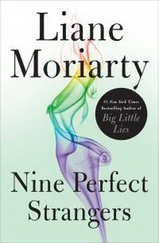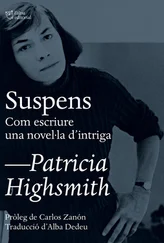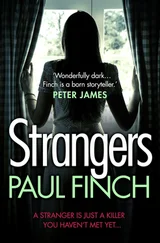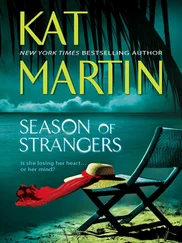He lighted a cigarette, then noticed he already had one. Hunched over the shiny black table, he smoked them both. His arms and hands with the cigarettes seemed mirrored. What was he doing here at 1:15 in the afternoon, growing swimmy on his third martini, making himself incapable of work, assuming he had any? Guy Haines who loved Anne, who had built the Palmyra? He hadn’t even the courage to throw his martini glass into the corner. Quicksand. Suppose he sank completely. Suppose he did kill for Bruno. It would be so simple, as Bruno said, when the house was empty except for his father and the butler, and Guy knew the house more exactly than his home in Metcalf. He could leave clues against Bruno, too, leave the Luger in the room. This thought became a single point of concreteness. His fists closed reflexively against Bruno, then the impotence of his clenched hands before him on the table shamed him. He must not let his mind go there again. That was exactly what Bruno wanted his mind to do.
He wet his handkerchief in the glass of water and daubed his face. A shaving cut began to sting. He looked at it in the mirror beside him. It had started to bleed, a tiny red mark just to one side of the faint cleft in his chin. He wanted to throw his fist at the chin in the mirror. He jerked himself up and went to pay his bill.
But having been there once, it was easy for his mind to go there again. In the nights when he could not sleep, he enacted the murder, and it soothed him like a drug. It was not murder but an act he performed to rid himself of Bruno, the slice of a knife that cut away a malignant growth. In the night, Bruno’s father was not a person but an object, as he himself was not a person but a force. To enact it, leaving the Luger in the room, to follow Bruno’s progress to conviction and death, was a catharsis.
Bruno sent him an alligator billfold with gold corners and his initials G. D. H. inside. “I thought this looked like you, Guy,” said the note inside. “Please don’t make things tough. I am very fond of you. As ever, Bruno.” Guy’s arm moved to fling it into a trashbasket on the street, then he slipped it into his pocket. He hated to throw away a beautiful thing. He would think of something else to do with it.
That same morning, Guy declined an invitation to speak on a radio panel. He was in no condition to work and he knew it. Why did he even keep coming to the office? He would have been delighted to stay drunk all day, and especially all night. He watched his hand turning and turning the folded compass on his desk top. Someone had once told him that he had hands like a Capuchin monk. Tim O’Flaherty in Chicago. Once when they had sat eating spaghetti in Tim’s basement apartment, talking of Le Corbusier and the verbal eloquence that seemed innate in architects, a natural concomitant of the profession, and how fortunate it was, because generally you had to talk your way. But it had all been possible then, even with Miriam draining him, merely a clean invigorating fight ahead, and somehow right with all its difficulties. He turned the compass over and over, sliding his fingers down it and turning it, until he thought the noise might be bothering Myers and stopped.
“Pull out of it, Guy,” Myers said amiably.
“It isn’t anything one snaps out of. One either cracks up or doesn’t,” Guy retorted with a dead calm in his voice, and then, unable to stop himself, “I don’t want advice, Myers. Thanks.”
“Listen, Guy—” Myers stood up, smiling, lanky, tranquil. But he did not come beyond the corner of his desk.
Guy got his coat from the tree by the door. “I’m sorry. Let’s forget it.”
“I know what’s the matter. Pre-wedding nerves. I had them, too. What do you say we go down and have a drink?”
Myers’ familiarity piqued a certain sense of dignity that Guy was never aware of until it was affronted. He could not bear to look at Myers’ untroubled, empty face, his smug banality. “Thanks,” he said, “I really don’t feel like it.” He closed the door softly behind him.
Twenty-three
Guy glanced again at the row of brownstones across the street, sure he had seen Bruno. His eyes smarted and swam, fighting the dusk. He had seen him, there by the black iron gate, where he was not. Guy turned and ran up his steps. He had tickets to a Verdi opera tonight. Anne was going to meet him at the theatre at 8:30. He didn’t feel like seeing Anne tonight, didn’t want Anne’s kind of cheering, didn’t want to exhaust himself pretending he felt better than he did. She was worried about his not sleeping. Not that she said much, but that little annoyed him. Above all, he didn’t want to hear Verdi. Whatever had possessed him to buy tickets to Verdi? He had wanted to do something to please Anne, but at best she wouldn’t like it very much, and wasn’t there something insane about buying tickets for something neither of them liked?
Mrs. McCausland gave him a number he was supposed to call. He thought it looked like the number of one of Anne’s aunts. He hoped Anne might be busy tonight.
“Guy, I don’t see how I can make it,” Anne said. “These two people Aunt Julie wanted me to meet aren’t coming until after dinner.”
“All right.”
“And I can’t duck out on it.”
“It’s perfectly all right.”
“I am sorry though. Do you know I haven’t seen you since Saturday?”
Guy bit the end of his tongue. An actual repulsion against her clinging, her concern, even her clear, gentle voice that had before been like an embrace itself—all this seemed a revelation he no longer loved her.
“Why don’t you take Mrs. McCausland tonight? I think it’d be nice if you did.”
“Anne, I don’t care at all.”
“There haven’t been any more letters, Guy?”
“No.” The third time she had asked him!
“I do love you. You won’t forget, will you?”
“No, Anne.”
He fled upstairs to his room, hung up his coat and washed, combed his hair, and immediately there was nothing to do, and he wanted Anne. He wanted her terribly. Why had he been so mad as to think he didn’t want to see her? He searched his pockets for Mrs. McCausland’s note with the telephone number, then ran downstairs and looked for it on the hall floor. It had vanished—as if someone had deliberately snatched it away to thwart him. He peered through the etched glass of the front door. Bruno, he thought, Bruno had taken it.
The Faulkners would know her aunt’s number. He would see her, spend the evening with her, even if it meant spending the evening with her Aunt Julie. The telephone in Long Island rang and rang and nobody answered. He tried again to think of her aunt’s last name, and couldn’t.
His room seemed filled with palpable, suspenseful silence. He glanced at the low bookshelves he had built around the walls, at the ivy Mrs. McCausland had given him in the wall brackets, at the empty red plush chair by the reading lamp, at his sketch in black and white over his bed entitled “Imaginary Zoo,” at the monk’s cloth curtains that concealed his kitchenette. Almost boredly he went and moved the curtains aside and looked behind them. He had a definite feeling someone was waiting for him in the room, though he was not in the least frightened. He picked up the newspaper and started to read.
A few moments later, he was in a bar drinking a second martini. He had to sleep, he reasoned, even if it meant drinking alone, which he despised. He walked down to Times Square, got a haircut, and on the way home bought a quart of milk and a couple of tabloids. After he wrote a letter to his mother, he thought, he would drink some milk, read the papers, and go to bed. Or there might even be Anne’s telephone number on the floor when he came in. But there wasn’t.
At about 2 in the morning, he got up from bed and wandered about the room, hungry and unwilling to eat. Yet one night last week, he remembered, he had opened a can of sardines and devoured them on the blade of a knife. The night was a time for bestial affinities, for drawing closer to oneself. He plucked a notebook from the bookshelf and turned through it hastily. It was his first New York notebook, when he was about twenty-two. He had sketched indiscriminately—the Chrysler Building, the Payne Whitney Psychiatric Clinic, barges on the East River, workmen leaning on electric drills that bit horizontally into rock. There was a series on the Radio City buildings, with notes on space, on the opposite page the same building with the amendations he would make, or perhaps an entirely new building of his own conception. He closed the book quickly because it was good, and he doubted if he could do as well now. The Palmyra seemed the last spurt of that generous, happy energy of his youth. The sob he had been suppressing contracted his chest with a sickening, familiar pain—familiar from the years after Miriam. He lay down on his bed in order to stop the next.
Читать дальше












